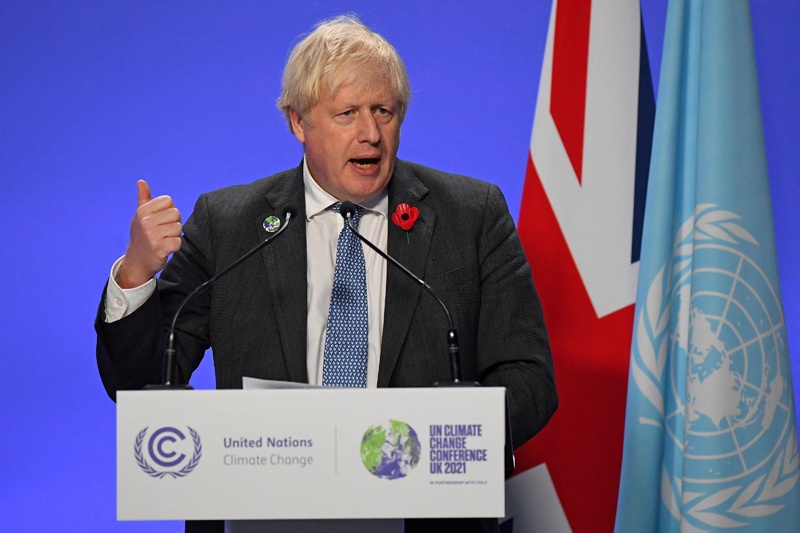 Britain's Prime Minister Boris Johnson
Britain's Prime Minister Boris JohnsonGLASGOW: A draft UN climate summit text Wednesday urged countries to boost their emissions cutting goals by 2022 - three years earlier than planned - as British Prime Minister Boris Johnson dashed back to Glasgow to check the pulse of negotiations. Wednesday's text was the first indication of where nations are 10 days into the COP26 talks in Glasgow, after data showed promises made so far left the world far off track to limit heating to 1.5C.
Negotiators are tasked with accelerating national decarbonization plans, stumping up long-promised finance for vulnerable nations and finalizing rules of the Paris Agreement on carbon markets and transparency. "Some significant issues remain unresolved and I think as we know time is not on our side," COP26 President Alok Sharma told delegates. "We all know what is at stake in these negotiations and the urgency of our task."
The text, which will change as ministers begin the high-level wrangling as COP26 enters its last two days, called for nations to "revisit and strengthen" their decarbonization plans by next year, instead of 2025 as previously agreed. It said that limiting heating to 1.5C - the Paris deal's most ambitious temperature goal - "requires meaningful and effective action by all parties in this critical decade".
"Rapid, deep and sustained reductions in global greenhouse gas emissions", said the text, were needed to avert the worst impacts of heating, which has already seen countries worldwide slammed by fiercer floods, droughts and storms. The 2015 accord contains a "ratchet" mechanism requiring countries to update emissions plans every five years.
Several large emitters missed the 2020 deadline for submitting new plans, known as nationally determined contributions (NDCs). Vulnerable nations say that the next deadline, in 2025, is too distant to deliver the short-term emissions cuts needed to avoid disastrous heating. In what observers said was a "significant first mention" of the fuels driving global warming, the draft summit called on countries to "accelerate the phasing out of coal and subsidies for fossil fuels".
Previous climate summit decisions and the Paris Agreement itself do not so much as mention fossil fuels, focusing instead on emissions. But the fossil fuel reference contained no deadline and it was unclear it would make the final text. Countries' latest decarbonization plans submitted under the Paris Agreement are likely to see Earth warm 2.7C this century, according to a United Nations assessment.
Climate scientists and environmental groups criticized the draft for failing to reflect the urgency of the crisis facing the planet. "This draft deal is not a plan to solve the climate crisis, it's an agreement that we'll all cross our fingers and hope for the best," said Greenpeace International Director Jennifer Morgan. "It's a polite request that countries maybe, possibly, do more next year."
Johnson - who took the train back to Glasgow after flying to a leaders summit in the Scottish city last week -was expected to issue an update on progress. Delegates came to Glasgow with a laundry list of disputes to be resolved, including over how vulnerable nations' fight against rising temperatures is financed. Rich emitters promised over a decade ago to provide $100 billion annually to help others green their grids and adapt to the changing climate.
But the draft text paid little attention to the figure, merely noting "with regret" that it had yet to materialize. "With this text our leaders are failing us all," said Teresa Anderson, climate policy coordinator at ActionAid International. "These empty words are way off target to meet the scale of the enormous challenge facing humanity."
Simon Lewis, professor of Global Change Science at University College London, said the draft "acknowledges the enormous gulf" between current emissions plans and a 1.5C pathway. But he told AFP that "if developed countries don't deliver on their financial promises, the talks may fall into disarray". Yesterday saw some countries and manufacturers set a target to end the sale of new petrol and diesel cars by 2040, although the world's largest producers were not on this list. - AFP










